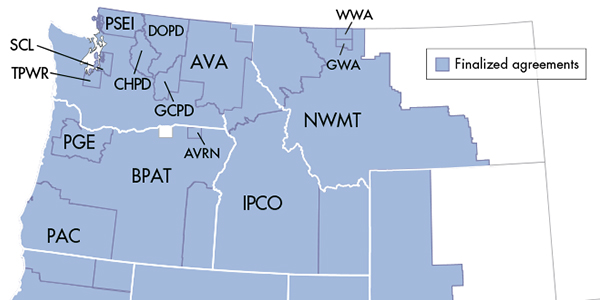By Robert Mullin
CAISO said Monday its RC West operation has achieved a “major milestone” after attaining the NERC certification needed to begin providing reliability coordinator services to balancing authorities in California and parts of Mexico on July 1.
The certification — issued by the Western Electricity Coordinating Council through its delegated authority from NERC — marks a key step in transitioning RC oversight of the Western grid away from Peak Reliability, which last summer announced it would be ceasing operations by the end of 2019.
“The NERC certification is an important turning point in our effort to become the reliability coordinator for the Western region,” CAISO CEO Steve Berberich said in a statement. “This was a huge lift for our staff since beginning this venture in January 2018, and the certification speaks to the dedication and hard work across the organization.”
In early January 2018, CAISO announced it would “reluctantly” depart from Peak Reliability and create its own RC — just a month after Peak floated its plan to develop an organized electricity market in partnership with PJM, competing with the ISO’s own expansion efforts. (See CAISO to Depart Peak Reliability, Become RC.) By last July, it was evident Peak would lose most of its customers to CAISO’s lower-cost services, prompting the Vancouver, Wash.-based company to begin winding down its own operations and pull out of the joint effort with PJM. (See Peak Reliability to Wind Down Operations.)
Since then, CAISO has worked quickly to stand up RC West as the Western Interconnection, facing the uncertain journey of moving from two to five RCs, with SPP, BC Hydro and Gridforce also sharing in the carve-out of Peak’s former territory. (See RC Transition Fraught with Pitfalls, WECC Hears.) The Alberta Electric System Operator has historically acted as its own RC and will continue to do so after the dissolution of Peak.
WECC conducted its full certification review of RC West in late March, which consisted of an onsite visit by observers from WECC, NERC and one other RC, as well as at least one BA and transmission owner. During the process, RC West staff were required to provide any requested documentation and answer questions intended to demonstrate readiness for taking on the RC function.
RC West operators have been shadowing Peak’s operations since May 1, taking part in nearly every call, including an energy emergency alert event occurring just hours into the process, Director of Operations Tim Beach told the RC Oversight Committee last month (See RC West Moving Smoothly Toward July Handover.)
The shadowing process also has RC West staff “verifying system data, conducting operational analysis and monitoring system conditions using situational awareness tools,” CAISO said Monday. The RC function now includes 17 full-time operators working on rotating shifts, with one position still open.
Beginning July 1, RC West will become the RC for 16 California BAs and transmission owners, as well as CENACE in northern Mexico. A second certification review is slated for August, ahead of RC West taking on 24 additional entities on Nov. 1. By then, it will have assumed oversight for about 87% of the West’s load.
SPP and Gridforce last month both said they’re on track to begin shadow operations with Peak in August in preparation for a Dec. 3 transition date. BC Hydro will take over RC functions within its own British Columbia territory Sept. 2 after commencing shadow operations in July. (See New RCs Tell WECC Transition on Schedule.)



